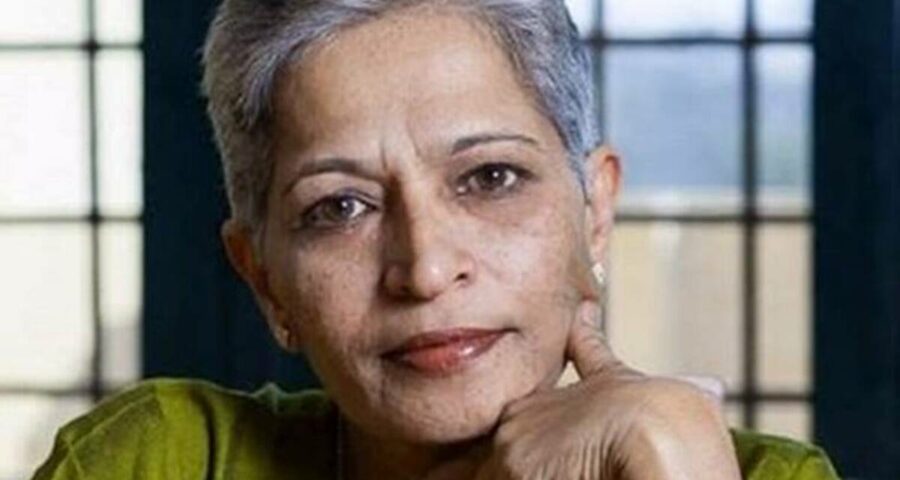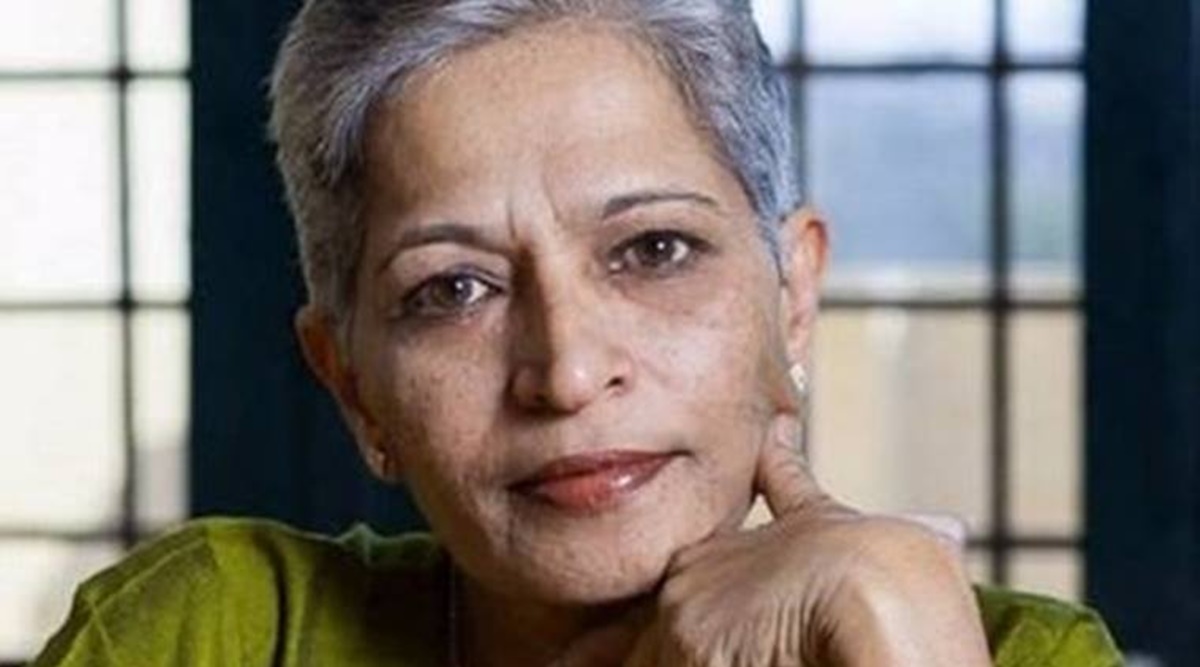Lankesh, an outspoken critic of the Right-wing Hindutva politics, was shot dead outside her home in west Bengaluru on the night of September 5, 2017 by two motorcycle-borne assailants.
While the trial of a group of 17 Right-wing extremists accused in the murder of journalist Gauri Lankesh, 55, is yet to begin, despite the passage of four years since the incident, local police investigations are continuing against the logistical supply network of the group.
Lankesh, an outspoken critic of the Right-wing Hindutva politics, was shot dead outside her home in west Bengaluru on the night of September 5, 2017 by two motorcycle-borne assailants.
In the recent weeks, new chargesheets have been filed over procurement of SIM cards by the network using fake identities and support network for use in the covert operations that led to the murder. A chargesheet was filed last month against accused number one in the murder case, Amol Kale, in the Manipal region of Karnataka for using stolen identities to procure SIM cards that were used for communicating during the planning and execution of the murder.
The police from the Kushalnagar area of Karnataka have quizzed two key accused — Mohan Nayak and Sujeet Kumar — over the SIM cards that they had used for communications ahead of the murder. The probe found that a former BSNL official in the Kushalnagar region had provided a number of SIM cards to the members of the Right-wing extremist group for usage without following procedures.
The BSNL official has been charged by the police and the matter has been settled through the payment of a minor fine through a Lok Adalat.
Senior members of the group like Amol Kale, Mohan Nayak, Sujeet Kumar and Rajesh Bangera – all associated with the Right-wing outfit Sanatan Sanstha and its affiliates like Hindu Janajagruthi Samiti — are alleged to have been involved in obtaining dozens of SIM cards.
In a chargesheet last month by Manipal police, it was found that Kale, the main accused in the murder, had used the identity of Vinod alias Samir, a farm labourer from Bylakuppe region near Kushalnagar to obtain the SIM cards.
Sources said dozens of cases were being dealt with by police in different parts of the state over procurement of SIM cards using fake identities to establish the secretive communication network that was used by the group of extremists.
The SIT had found that the Hindutva outfit used an elaborate communication system to stay under the radar of investigations. Its chargesheet filed in the court says the group was found to be using separate mobile phones to communicate with each person it had recruited for extremist activities.
Following the 2018 arrests of Kale, 37, and a recruiter for the group Sujeet Kumar, 38, the SIT found a stash of 20 mobile phones in a bag carried by Kale and 22 mobile phones from the kitchen shelves of a house in Udupi where Kumar had been living.
Each of the 42 basic mobile phones found with Kale and Sujeet was used exclusively to talk to respective individuals. Police also found several SIM cards on Kumar after his arrest.
“Maintaining secrecy is the prime focus of our group. When we recruit any youth for our activities, we never give him our mobile number. We speak to them only through public phone booths initially. Once we are sure that a youth is suited to be a part of our activities, we provide them with a mobile phone to be used for exclusive communication with us and designate a code name for the youth,” Sujeet Kumar is quoted as saying in a statement placed before the court.
The chargesheet also mentions, “The members of this organisation targeted persons who they identified to be inimical to their belief and ideology. The members strictly followed the guidelines and principles mentioned in ‘Kshatra Dharma Sadhana’, a book published by Sanatan Sanstha.”
Meanwhile, despite the passage of over 33 months since the filing of a chargesheet against the 17 accused persons, the trial in the case is yet to begin. The accused have filed a barrage of applications for bail and discharge and aspects like invoking of the stringent Karnataka Control of Organized Crime Act, 2000 are resulting in delays in the trial despite the High Court on February 11, 2019 ordering to expedite the process.
In a February 2021-order, the principal sessions court in Bengaluru had said, “On perusal of the entire order sheet, it would go to show that the matter came to be adjourned from time to time, due to intervening applications filed by one or the other accused. The hearing of the earlier bail application and discharge application also has consumed sufficient time.”
“Thereafter, in the year 2020, due to the Covid-19 pandemic, functioning of the court was stalled. The accused are split and placed in different jails and they are represented by separate counsels. The order sheet also would reveal at whose instance the case was being adjourned,” the court had said while rejecting a bail plea filed by the accused on grounds of delay of the trial.
In the recent weeks, the court expressed angst over the delays being caused in the trial by the accused themselves by filing various applications.
On August 9, the sessions court asked advocates of two accused to present their arguments in a fresh bail plea but they cited a pending case in the Supreme Court to seek time. On August 17, an adjournment was sought again by the accused, citing the pending Supreme Court case but the court observed that the case in the apex court was not connected to the grounds on which the bail is sought.
“The counsel for A-11 and 17 prays time on the ground that the matter is pending before the Hon’ble Supreme Court so far as A-11 is concerned about KCOCA Act. The said matter has nothing to do with the bail application filed by A-11 and 17. Hence the counsel for A-11 and 17 is directed to argue the matter on bail application or else this court will proceed further,” the court said.
On August 21, when the matter came up, the bail application was rejected after more time was sought. “The counsel for A-11 and 17 again prays for time. No grounds to grant further time. There is no progress in the case on account of one or the other application being filed in this case. Hence it is treated that there are no arguments on the bail application of A-11 and 17,” the court said.
On August 27, the principal sessions court posted the matter for “framing of charge or plea”.
The SIT probe had also found that the group responsible for Lankesh’s murder in Bengaluru was also behind the killings of three progressive thinkers in Maharashtra and Karnataka between 2013 and 2018. A 7.65mm country-made pistol, that was used to gun down the journalist, was the exact same gun that was used to kill Kannada scholar M M Kalburgi, 77, at his home in Dharwad on August 30, 2015.
The same gun was also found to have been used to shoot Leftist thinker Govind Pansare, 81, in Maharashtra’s Kolhapur on February 16, 2015 (he died on February 20, 2015). A second gun used in the Pansare shooting was found to match with a gun used to shoot Maharashtra rationalist Narendra Dabholkar, 69, in Pune on August 20, 2013.
Source: Read Full Article



